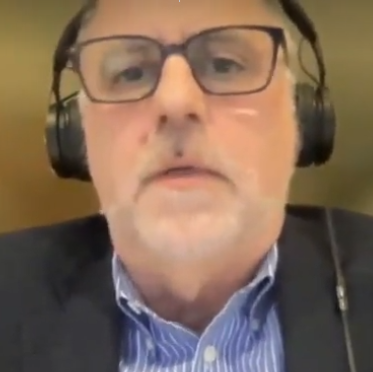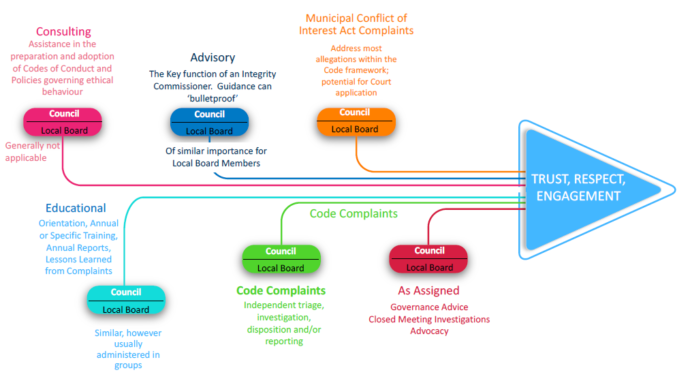 By Pepper Parr
By Pepper Parr
January 11th, 2023
BURLINGTON, ON
Minor update: Report used covers the period from May 1, 2020 to July 31, 2021.
There has been a lot of news about decisions that have been made by the Integrity Commissioner for Burlington – many people don’t know all that much about how they operate.
Recently, in Burlington, the Commissioner has been busy.
We were aware of the complaint made by two Councillors, Rory Nisan and Kelvin Galbraith, against Councillor Stolte, and the self-complaint that Lisa Kearns made to the Commissioner when she spoke about what she was not supposed to talk about – the amount of money the city had budgeted to defend the Waterfront Hotel development that was before the Ontario Land Tribunal.
Then there was the complaint Tom Muir made about Conflict of Interest Matters related to property owned by Ward 1 Councillor Kelvin Galbraith.
Four of the seven members of Council have been the object of complaint taken to the Commissioner. That must be some kind of a record. We recently became aware of an additional complaint that didn’t go anywhere.
We wonder just how many complaints have been taken to the Commissioner by members of Council.
The Commissioner makes an annual report to Council. The most recent that is publicly available is dated September 2021. UPDATE: Report used covers the period from May 1, 2020 to July 31, 2021.
Municipal Freedom of Information and Protection of Privacy Act (MFIPPA)
In its report Principles Integrity said:
“The purpose of an integrity commissioner’s annual report is to provide the public with the opportunity to understand the ethical well-being of the City’s elected and appointed officials through the lens of our activities.

Jeffrey A. Abrams: Co-Principal / Integrity Commissioner at Principles Integrity
“Principles Integrity, a partnership focused on accountability and governance matters for municipalities was formed in 2017. Since its formation, Principles Integrity has been appointed as integrity commissioner (and occasionally as lobbyist registrar and closed meeting investigator) in over 40 Ontario municipalities and other public bodies. Principles Integrity is an active member of the Municipal Integrity Commissioner of Ontario (MICO)
Jeffrey A. Abrams and Janice Atwood-Petkovski, are Co-Principals at Principles Integrity, both are lawyers.
• Advice on ethical policy development
• Education on matters relating to ethical behaviour
• Providing on request, advice and opinions to members of Council and members of Local Boards
• Providing, on request, advice and opinions to Council
• Provide a mechanism to receive inquiries (often referred to as ‘complaints’) which allege a breach of ethical responsibilities
• Resolving complaints, and
• Where it is in the public interest to do so, investigating, reporting and making recommendations to council within the statutory framework, while being guided by Council’s codes, policies and protocols.
“This might contrast with the popular yet incorrect view that the role of the integrity commissioner is primarily to hold elected officials to account; to investigate alleged transgressions and to recommend ‘punishment’. The better view is that integrity commissioners serve as an independent resource, coach, and guide, focused on enhancing the municipality’s ethical culture.
“The operating philosophy of Principles Integrity recites this perspective. We believe there is one overarching objective for a municipality in appointing an integrity commissioner, and that is to raise the public’s perception that its elected and appointed officials conduct themselves with integrity:
“The perception that a community’s elected representatives are operating with integrity is the glue which sustains local democracy. We live in a time when citizens are skeptical of their elected representatives at all levels. The overarching objective in appointing an Integrity Commissioner is to ensure the existence of robust and effective policies, procedures, and mechanisms that enhance the citizen’s perception that their Council (and local boards) meet established ethical standards and where they do not, there exists a review mechanism that serves the public interest.
The practical effect of achieving this objective is an increase in trust, respect and engagement in local affairs.
“In carrying out our broad functions, the role falls into two principal areas. ‘Municipal Act’ functions, focused on codes of conduct and other policies relating to ethical behaviour, and ‘MCIA’ or Municipal Conflict of Interest Act functions. From an activity perspective, an integrity commissioner’s role can be depicted this way:
 Advocacy
Advocacy
“The emphasis of Principles Integrity is to help municipalities enhance their ethical foundations and reputations through the drafting of effective codes of conduct and other policies governing ethical behaviour, to provide meaningful education related to such policies, and to provide pragmatic binding advice to Members seeking clarification on ethical issues.
“Because the development of policy and the provision of education and advice is not in every case a full solution, the broad role of the integrity commissioner includes the function of seeking and facilitating resolutions when allegations of ethical transgressions are made, and, where it is appropriate and in the public interest to do so, conducting and reporting on formal investigations. This in our view is best seen as a residual and not primary role.
Confidentiality:
“Much of the work of an integrity commissioner is done under a cloak of confidentiality. While in some cases secrecy is required by statute, the promise of confidentiality encourages full disclosure by the people who engage with us. We maintain the discretion to release confidential information when it is necessary to do so for the purposes of a public report, but those disclosures would be limited and rare.
Our Activity on your behalf:
“During the period covered by this report, we have been engaged in a moderate level of activity as Integrity Commissioner for the City of Burlington which subdivides roughly into three categories:
1. Policy Development and Education
“During the period covered by this report, while there has not been an opportunity to provide training, we have been available to senior administration regarding ethical and governance issues.
“As part of our responsibilities as Integrity Commissioner, over the coming months, we will be reviewing the City of Burlington’s Code of Good Governance and will be providing recommendations regarding required updates.
“Where, as in Burlington, Members also serve on Regional Council, it is helpful when Codes for both City and Regional Council align. Given that we also serve as Halton Region’s Integrity Commissioner, we will endeavour to ensure such alignment, and will keep this in mind during our review.
2. Advice
“The advice function of the integrity commissioner is available to all Members of Council and where applicable their staff and Members of local boards on matters relating to the code of conduct, the Municipal Conflict of Interest Act and any other matter touching upon the ethical conduct of Members.
“Advice provided by the integrity commissioner is confidential and independent, and where all the relevant facts are disclosed, is binding upon the integrity commissioner.
“Our advice is typically provided in a short Advice Memorandum which confirms all relevant facts and provides with clarity our analysis and a recommended course of action.
Though advice is confidential, we can advise that the bulk of the issues we provided guidance on this year arose in the context of properly identifying and appropriately recognizing actual and perceived conflicts of interest. The clarifications and guidance provided to Members seemed to be readily understood and welcome.
“During the period covered by this report, we responded to nine (9) such requests for advice.
3. Complaint Investigation and Resolution
“Our approach to reviewing complaints starts with a determination as to whether an inquiry to us is within our jurisdiction, is beyond a trifling matter, is not either frivolous or vexatious, and importantly, whether in its totality it is in the public interest to pursue. We always look to the possibility of informal resolution in favour of formal investigation and reporting. Once a formal investigation is commenced, the opportunity to seek informal resolution is not abandoned.
“Where we are able to resolve a matter without concluding a formal investigation, our practice is to provide a written explanation in the form of a Disposition Letter to the complainant to close the matter. Often the respondent Member is involved in preliminary fact-finding and will also be provided with a summary of the disposition.
“Where formal investigations commence, they are conducted under the tenets of procedural fairness and Members are confidentially provided with the name of the Complainant and such information as is necessary to enable them to respond to the allegations raised.
“During the period covered by this report, one inquiry was brought to our attention by a member of the public. The inquiry related three separate issues, which were intermingled operational complaints with claims about involvement by members of Council. Following lengthy discussion of the facts including explanation of the respective roles of staff and members of Council, the complainant determined not to file a formal complaint in pursuit of the matter.
Ethical Themes Around the Province:
“With due regard to our obligation to maintain confidentiality, this annual report enables us to identify learning opportunities from advice requests and investigations conducted in a variety of municipalities.
Non-disparagement
“One area of prominence continues to be the failure of some Members of Council to adhere to rules against disparagement. Members of Council are entitled, and indeed expected to disagree on all manner of issues. However, one of the cornerstones to democracy must be the recognition that different opinions and perspectives are to be respected, and disagreement should not devolve into disrespect, disparagement and name-calling.
“Disrespectful interactions and/treatment of others can fall along a continuum which may manifest as occasional incivility and micro-aggressions, but when unchecked can culminate in bullying and harassment. Members of Council should be mindful to treat each other, staff and the pubic with appropriate respect and professionalism at all times.
“Some Members of Council hold a view was that they are entitled to their freely express their opinion, even if that includes disparagement of others, and so long as they share it via personal email, and not on the municipal server, they are not constrained by any rules around decorum. This is incorrect. Members are bound by the Code provisions of respectful and non-disparaging communication, whether sharing views on their own email, social media, or elsewhere.
“Regardless of the medium, regardless of the intended audience, and regardless of motive, we have observed several instances where Members of Council in municipalities around the province have been found to have breached ethical standards by saying or recording things they have come to regret.
“With respect to social media, we recently reported on the practice of an elected official who used an open Twitter account (where other users of the platform may join a discussion without seeking permission from the account holder) and who arbitrarily blocked a follower. Open social media accounts are, particularly during a pandemic, akin to the ‘town square’. Persons may be blocked from participating, but only on notice, and for proper reasons. We recommended that the municipality adopt policy guidance on the practice, and we recommend that the City consider this approach as well.
Recognizing and avoiding conflicts of interest
“Another area Members frequently require additional clarification on is recognizing and appropriately identifying conflicts of interest when they arise. These often include when members are part of another organization or club whose interests are impacted by a matter before Council, or when members are active professionally within the community and a matter before Council may potentially impact one of their current or past clients.
“As always, obtaining clear and reliable advice from the integrity commissioner can help avoid costly and time-consuming investigations.
Staying in your lane
“One area of concern that arises from time to time is members of Council overstepping their role, attempting to ‘take the reins’ to fix a constituent’s problem, or directing staff how to do their job. Members of Council serve an important role in putting constituents in touch with appropriate staff, and following established processes, but it is important to strike the correct balance. Failing to recognize this may be perceived by staff as undermining staff or interfering with their duties, and may attract exposure for the Member and the municipality where the Member’s activities are not in compliance with the relevant regulatory scheme (such as using mandated personal protective equipment; following proper risk management processes; ensuring safety for the Member, their constituents, and the general public). Equally importantly, it interferes with the line- management routines properly established by the municipality so that its workers have clarity in who they are to take instructions from.
Provincial Consultation regarding Codes of Conduct
“Early in 2021 the Provincial Government announced a consultation on strengthening accountability regarding municipal codes of conduct, which consultation period concludes July 15, 2021. Principles Integrity is working with MICO to provide input to the Province to improve the framework while recognizing the many components which are currently working effective.”
Principles Integrity is part way through their second contract with the city of Burlington.

















